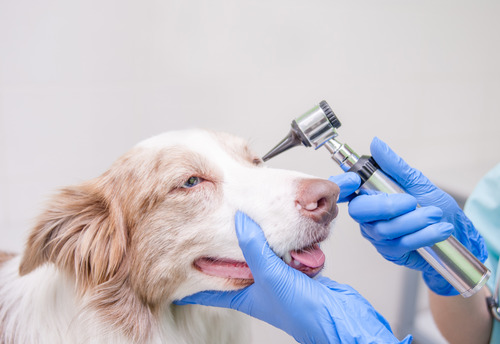Dogs often communicate through their eyes, expressing everything from excitement to discomfort. When you notice your dog’s eyes appear swollen, this may indicate anything from a minor irritation to a more serious underlying issue. At North Jersey Animal Hospital, we’re here to support pet owners in Wayne, NJ, with expert veterinary services. Our team can help determine the cause of your dog’s condition. If your dog has swollen eyes, call us at (973) 595-8600 or request an appointment online.
Why Are My Dog’s Eyes Swollen?
Swollen eyes in dogs can result from various factors, ranging from simple irritants to complex medical conditions.
Allergies
Dogs, like humans, can experience allergies that affect their eyes. Common allergens include pollen, dust, mold, and certain foods. Allergic reactions may lead to redness, swelling, and discharge from the eyes. Your dog may also rub their eyes with their paws, causing further irritation. Seasonal allergies are especially common and often coincide with changes in weather. If allergies are the cause, your veterinarian may recommend diagnostic testing to pinpoint specific triggers.
Eye Infections
Bacterial, viral, or fungal infections can lead to inflammation and discomfort. Conjunctivitis, also known as pink eye, is a common infection that causes swelling, redness, and discharge. In some cases, eye infections may spread from other parts of the body, such as the respiratory system. Prompt veterinary care is essential to prevent the infection from worsening.
Trauma or Injury
Scratches, bites, or blunt force injuries can cause swelling, redness, and sensitivity to light. Dogs may injure their eyes during rough play, encounters with other animals, or contact with sharp objects. If your dog’s eye appears swollen after an injury, immediate veterinary attention can help prevent long-term damage.
Medical Conditions Linked to Swollen Eyes in Dogs
While some causes of swollen eyes in dogs are straightforward, others may be linked to more complex medical conditions. These require thorough evaluation by your veterinarian.
Glaucoma
Glaucoma is a serious condition that results from increased pressure inside the eye. It can cause severe pain, swelling, and vision loss if left untreated. Common signs of glaucoma include redness, cloudiness, and a visibly enlarged eye. This condition often progresses quickly, making early diagnosis and treatment critical.
Uveitis
Uveitis refers to inflammation of the uvea, the middle layer of the eye. This condition can result from infections, immune system disorders, or trauma. Dogs with uveitis often show symptoms such as swollen eyes, excessive tearing, and squinting. Uveitis can lead to complications, including glaucoma or cataracts, if not addressed promptly.
Eyelid Disorders
Eyelid abnormalities, such as entropion or ectropion, can also contribute to swollen eyes in dogs. Entropion occurs when the eyelids roll inward, causing irritation and inflammation as the eyelashes rub against the eye. Ectropion, on the other hand, is characterized by outwardly turned eyelids, which can expose the eye to irritants and lead to swelling. Both conditions may require surgical correction to improve your dog’s comfort and eye health.
External Irritants and Environmental Factors
Sometimes, swollen eyes in dogs are triggered by external factors in their environment. Identifying and managing these can help reduce the likelihood of future episodes.
Foreign Objects
A foreign object, such as a speck of dirt, a piece of grass, or an insect, can lodge in your dog’s eye, causing immediate irritation and swelling. Dogs may paw at their eyes in an attempt to remove the object, which can worsen the problem. If you suspect a foreign object, it’s important to seek veterinary assistance to avoid further damage.
Chemical Irritants
Household products like cleaning solutions, perfumes, or insect repellents can irritate a dog’s eyes, leading to swelling. Even shampoo or soap used during grooming can cause irritation if it accidentally gets into the eyes. Always use pet-safe products and keep potential irritants out of reach.
Environmental Factors
Exposure to wind, smoke, or debris can irritate your dog’s eyes, especially during outdoor activities. Swelling caused by environmental factors is often temporary but should be monitored to ensure it resolves without complications.
When Should You Contact Your Veterinarian for Help?
While minor cases may resolve on their own, persistent or severe swelling warrants professional attention. Additional signs that require immediate care include the following:
- Significant swelling that worsens over time
- Discharge that is thick, yellow, or green
- Changes in eye color or cloudiness
- Excessive tearing or squinting
- Visible injury or bleeding
If your dog exhibits any of these symptoms, contact North Jersey Animal Hospital at (973) 595-8600. Our veterinary team can evaluate your dog’s condition and recommend the appropriate treatment.
How Vets Diagnose and Treat Swollen Eyes in Dogs
Veterinary care for swollen eyes in dogs often involves a combination of diagnostic tests and treatments tailored to your pet’s needs.
Diagnostic Steps
- Physical Examination: Your veterinarian will examine your dog’s eyes for signs of injury, infection, or abnormalities.
- Fluorescein Staining: This test uses a special dye to identify corneal ulcers or scratches.
- Intraocular Pressure Measurement: This procedure checks for conditions like glaucoma.
- Blood Tests: These can help identify systemic conditions contributing to eye problems.
Addressing Swollen Eyes in Dogs
- Medications: Eye drops or ointments may be prescribed to reduce inflammation, treat infections, or manage pain.
- Surgical Intervention: In cases involving severe injury or structural abnormalities, surgery may be necessary.
- Environmental Modifications: Reducing exposure to allergens or irritants can help prevent recurring issues.
Caring for your dog’s eyes can reduce the likelihood of swelling and other issues. Regular check-ups, a safe environment, and prompt attention to symptoms are key to maintaining their well-being. If your dog experiences swollen eyes, don’t wait to seek help. Call North Jersey Animal Hospital at (973) 595-8600 or request an appointment online to ensure your pet gets the care they need.





